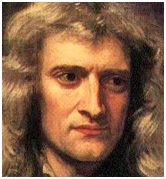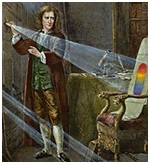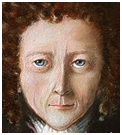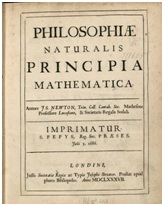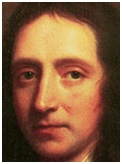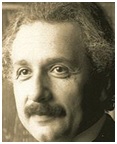|
 |
|
 |
Isaac Newton - Creativity and Science
Isaac Newton (1642-1727)
English scientist (pictured right in 1689). Famous for
The greatest ever scientist, according to Albert Einstein. Born in Lincolnshire, England, he went to:
His most famous book is... Principia (1687). Why was he so creative?
He loved making things and experimenting with new ideas. As a child, he made a working windmill, driven by mice in a treadmill! He was one of the first people to test his ideas and theories by experiments.
2. Curiosity He was fascinated with the things around him and how they worked. For example, his interest in colour led to his experiments with prisms (see point 3).
3. Questioning He never stopped questioning tradition and existing ideas to find new knowledge. “My best friend is truth”, he said. This led to his revolutionary discoveries about gravity, motion and colour. Using a prism (pictured right), he proved that:
4. Inspiration and perspiration His theories relied much more on incredible hard work than flashes of inspiration. The famous story of his discovery of gravity from an apple falling on his head was probably made up by Newton to disguise the fact that it had taken 20 years of intense effort to work it out. He often worked 18 or 20 hours a day.
5. Determination and courage He was prepared to endure physical pain and nervous exhaustion in his search for knowledge. He put an ivory toothpick underneath his eyeball to see different colours! 6. Competitiveness He liked to be the first person to find something, leading to his vindictive and unresolved dispute with Gottfried Leibniz (pictured right) over which one of them had invented calculus first. He also had a bitter rivalry with Robert Hooke (pictured right below), the English philosopher and architect.
7. Seeking simplicity He looked for simple, universal laws to explain complicated things (like his laws of motion). He hated over-complicating the truth.
8. Thinking, concentration and solitude Newton:
When asked how he wrote his masterpiece, Principia (pictured right is the first edition), he replied “by thinking on it continually”. His years of solitary study at home (1665-7) were particularly productive, when he was forced to leave Cambridge University, because of the plague. As an only child, he loved working on his own, particularly after:
This desertion may have given him the ambition to prove himself.
9. Lifelong learning He was single-mindedly obsessed with learning and finding new knowledge. Time spent doing anything else was wasted, he believed. He didn’t marry and hardly had any friends, although the astronomer, Edmond Halley, pictured right (of Halley’s Comet fame), encouraged him greatly. Newton described himself as like a boy on a beach finding smoother pebbles or prettier shells (i.e. new bits of knowledge), whilst “the great ocean of truth lay all undiscovered before me”.
10. Arrogance with some humility He had an arrogant self-confidence in his genius. He purposely made his book, Principia, unintelligible to most people, because he didn’t want ignorant people criticizing it! But he never lost his gratitude for the knowledge he gained from others. “If I have seen further, it is by standing on the shoulders of giants”, he said in 1675. As a Christian, he was also humbled by his insignificance relative to God and His universe. 11. Applying different subjects He applied his detailed knowledge of mathematics, physics, astronomy and alchemy. Particularly important for alchemists is the philosopher’s stone that converts base metals into gold. This explains the title of J.K. Rowling’s (pictured right) first Harry Potter book! 12. Imagination Like Albert Einstein (pictured right), imagination was vital to his work.
Key quotes on learning and wisdom If I have seen further, it is by standing on the shoulders of giants. My best friend is truth. Truth is ever to be found in simplicity
Key quotes on science and creativity I seem to have been only a boy playing on the sea-shore and diverting myself in now and then finding a smoother pebble or a prettier shell than ordinary, whilst the great ocean of truth lay all undiscovered before me. If I have ever made any valuable discoveries, it has been owing more to patient attention, than to any other talent. I do not invent hypotheses. (Newton’s slogan).
Key quote on innovation There is one thing stronger than all the armies in the world, and that is an idea whose time has come.
Key quote on change We build too many walls and not enough bridges. |
|
|
||
|
|
|
||
|
||
| Copyright © wisdomtowin.com All Rights Reserved | ||
|

